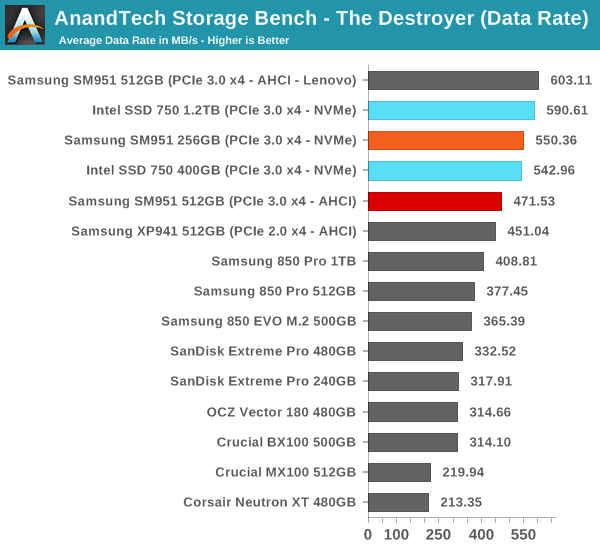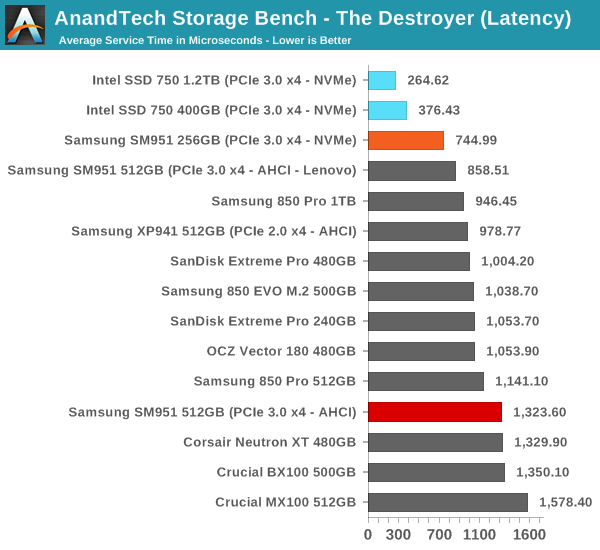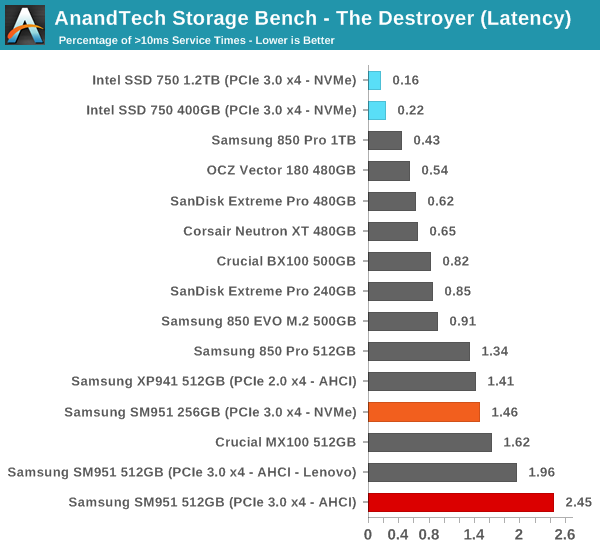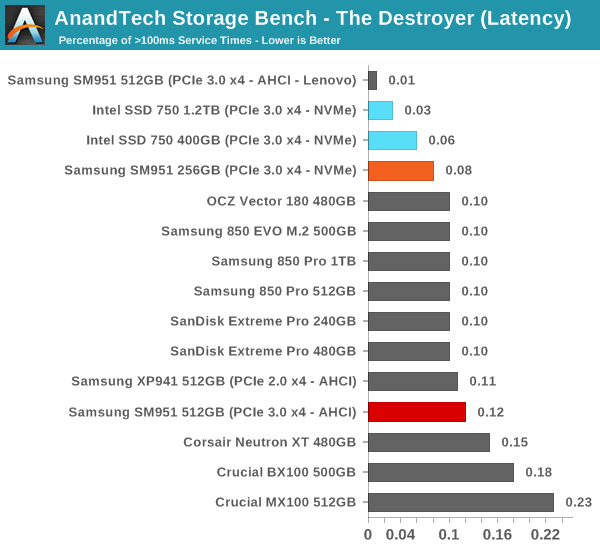Samsung SM951-NVMe (256GB) PCIe SSD Review
by Kristian Vättö on June 25, 2015 9:40 AM ESTAnandTech Storage Bench - The Destroyer
The Destroyer has been an essential part of our SSD test suite for nearly two years now. It was crafted to provide a benchmark for very IO intensive workloads, which is where you most often notice the difference between drives. It's not necessarily the most relevant test to an average user, but for anyone with a heavier IO workload The Destroyer should do a good job at characterizing performance. For full details of this test, please refer to this article.

In our The Destroyer trace, the SM951 NVMe is faster than the AHCI version despite having only half the NAND, but it still gets beaten by the SSD 750 (although the SSD 750 has more NAND as well). As I mentioned in the review, the SSD 750 has excellent small IO performance under intensive IO loads, resulting in much lower latency than what the SM951 offers, but since it performs more poorly with sequential IOs the average data rate is equivalent to the SM951 NVMe. What's surprising, though, is the fact that the SM951 AHCI that was pulled from the Lenovo laptop is in fact considerably faster than the stock SM951 we received straight from Samsung. I even ran the trace twice the ensure that it's not a benchmark anomaly, but maybe there is something wrong with my sample given that even the XP941 and several SATA 6Gbps drives outperform it.

The SM951 NVMe also has a higher share of high latency IOs than the SSD 750, but that's quite typical to smaller capacity Samsung drives.












74 Comments
View All Comments
kspirit - Saturday, June 27, 2015 - link
Thank you, I appreciate the response. I'll check it out :)fastfood8891 - Thursday, June 25, 2015 - link
@Kristian VättöFor that one graph on page 3, why do you divide IOPS by the standard deviation? I understand you are showing that this drive is a lot more consistent than the others, I just wonder what the mathematical intuition behind this value is.
Kristian Vättö - Thursday, June 25, 2015 - link
It's just a key ratio. Standard deviation alone is a bad metric because it doesn't take the performance into account at all. It wouldn't be fair to compare stdev of a drive that does 15K IOPS against a drive that does 5K IOPS because if the two had equivalent stdev the impact would be much more severe on the slower one (e.g. frequent 50% drops in performance, whereas only 15% for the 15K IOPS drive).krumme - Friday, June 26, 2015 - link
Enjoy this man guys while we have him. This is competence at its finest.JellyRoll - Friday, July 10, 2015 - link
Well, if competency consists of him originally presenting test results wrong in several articles, and then a reader correcting him in the comments of the 750 article, and then him adopting the correct method...well, yeah. Then that is competency. (that is what happened)fastfood8891 - Saturday, June 27, 2015 - link
makes sense, thank you for the explanation.Samus - Thursday, June 25, 2015 - link
First gen. Give it time. Seems like a dedicated nvme controller (ala Intel) would improve random performance...it looks like this controller is already running near its capability in AHCI mode.But as with everything nand, mature firmware will help
willis936 - Thursday, June 25, 2015 - link
Exciting stuff. Does anyone know if current broadwell laptops can be retrofitted with nvme M.2 drives in the future? Specifically the xps 13 2015. It's a hot item with poor storage options.extide - Thursday, June 25, 2015 - link
That laptop, probably yes. Best place to check would be the notebookreview forums -- they should have a specific forum for that laptop and you can ask there, or see if someone has already swapped in a PCIe drive. -- You need to verify 1) That the m.2 slot is actually pcie and not just sata, and 2) that it supports nvme in the bios, but being broadwell, you can probably assume it does.lilmoe - Thursday, June 25, 2015 - link
Is there any tangible difference in CPU utilization using NVMe? Would be nice if there was a graph...